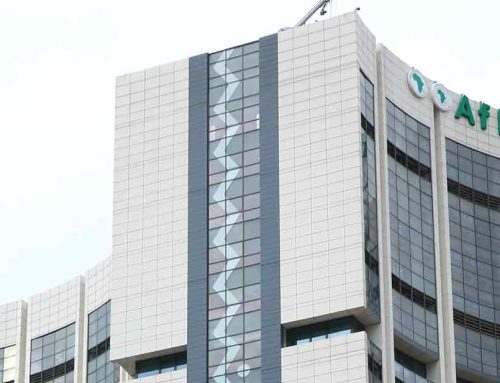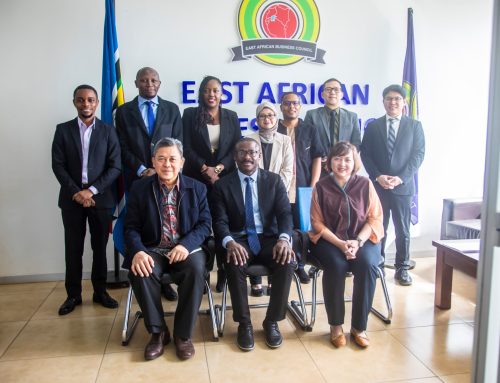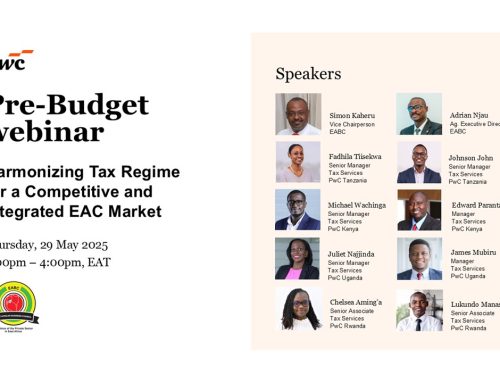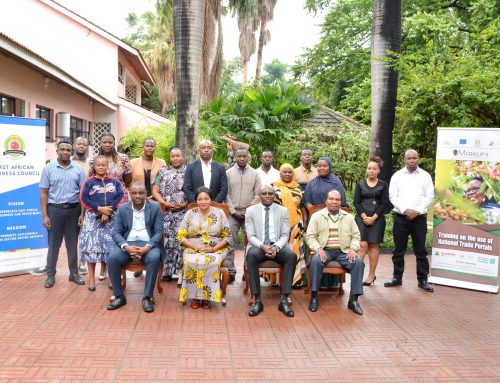Tuesday, 14th February 2023 Arusha, Tanzania: Speaking during the Validation Webinar for the Study on Discriminative Taxes & Harmonisation of Excise Duties in the East African Community (EAC) organized by East African Business Council (EABC) in partnership with TradeMark Africa (TMA), funded by Ministry of Foreign Affairs of the Netherlands, Mr. John Bosco Kalisa, CEO EABC urged the Governments of EAC Partner States to adhere to Article 15:2 of Customs Union Protocol that states “No Partner State shall impose, directly or indirectly, on the products of
other Partner States any internal taxation of any kind in excess of that imposed,
directly or indirectly, on similar domestic products.”
He urged the Governments to eliminate discriminatory taxes and expedite the harmonization of domestic taxes in the EAC to attract more cross-border and foreign direct investments.
Mr. Kalisa explained unharmonised taxes distort intra-EAC trade & cross border investment and frustrate the free movement of goods, services, service suppliers and workers. Other repercussions include an unlevelled playing field for business and difficulties in marketing the EAC bloc as a single investment destination.
On a positive note, Mr. Kalisa said that East Africa is still the best-performing economy in Africa despite the global shocks.
In her remarks, Ms. Paveen Mbeda, TMA Head of Public-Private Dialogue and Export Capability reiterated TradeMark Africa’s commitment to partner with both public and private sectors to ensure tax systems are aligned to unlock the full potential of the EAC bloc and drive sustainable and equitable growth.
On his part, Dr. Pantaleo Joseph Kessy, Principal Economist, East African Community Secretariat said “the EAC single currency is set to be in place in 2031 and the EAC Secretariat is updating the provision of the Double Taxation Agreement which is expected to be ready for ratification by end of the year.”
Mr. Simon Kaheru, EABC Vice-Chair called for private sector participation in the tax harmonization process. He cited that in other EAC Partner States, there are proposals to increase the digital tax stamps to a higher rate than the excise duty. He noted that such proposals affect business growth, competitiveness and investment across East African borders.
On his part, Mr. Ian Hirschfeld from Coca-Cola Africa said the EAC bloc should set standardization of excise tax.
The preliminary findings of the study show the excise duty rates across the EAC region are generally on the high side and have a ripple effect on the cost of doing business. It also shows that Electronic Tax Stamp is high for manufacturers. For example, ETS has been introduced on carbonated soft drinks in Tanzania since August 2019 at US$ 3.60 per 1000 stamps. Afterward, this was fixed at TZS 8,082.62 per 1000 stamps. As a result, businesses have been incurring significant additional costs to manufacture, resulting in loss of margins and difficulty to support their working capital requirements.
The study recommends removing excise duty on all, non-harmful goods, and services such as telecommunication products/ services as well as financial services.
The webinar on Discriminative Taxes & Harmonisation of Excise Duties in EAC was attended by over 130 actors who validated the study findings.





